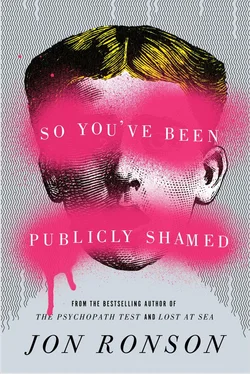• • •
A few weeks after Michael told me his Jonah Lehrer story, I was at a party in London, talking to a man I didn’t know. He was a theater director. He asked me what I was writing about and I told him about Michael and Jonah. Sometimes, when I recount for people the stories I’m working on, I feel a stupid grin on my face as I describe the absurdity of whatever crazy pickle this or that interviewee had got himself into. But not this time. As I related the details to him, the director shivered. And I found myself shivering too. When I finished the story, he said, “It’s about the terror, isn’t it?”
“The terror of what?” I said.
“The terror of being found out,” he said.
He looked as if he felt he were taking a risk even mentioning to me the existence of the terror. He meant that we all have ticking away within us something we fear will badly harm our reputation if it got out — some “I’m glad I’m not that ” at the end of an “I’m glad I’m not me.” I think he was right. Maybe our secret is actually nothing horrendous. Maybe nobody would even consider it a big deal if it was exposed. But we can’t take that risk. So we keep it buried. Maybe it’s a work impropriety. Or maybe it’s just a feeling that at any moment we’ll blurt something out during some important meeting that’ll prove to everyone that we aren’t proper professional people or, in fact, functional human beings. I think that even in these days of significant oversharing we keep this particular terror concealed, like people used to with things like masturbation before everyone suddenly got blasé about it online. With masturbation, nobody cares. Whereas our reputation — it’s everything.
I had leaped into the middle of the Michael — Jonah story because I admired Michael and identified with him. He personified citizen justice, whereas Jonah represented literary fraud in the pop-science world. He made a fortune corrupting an already self-indulgent, bloated genre. I still admired Michael. But suddenly, when the theater director said the words the terror of being found out , I felt like a door had briefly opened before me, revealing some infinite horror land filled with millions of scared-stiff Jonahs. How many people had I banished to that land during my thirty years of journalism? How truly nightmarish it must have been to be Jonah Lehrer.
Runyon Canyon, West Hollywood. If you were a passing hiker and you didn’t know that Jonah Lehrer had been totally destroyed, you wouldn’t have guessed it. He looked like he did in his old author photographs — pleasing to the eye, a little aloof, as if he were thinking higher thoughts and expressing them in a considered manner to his fellow hiker — me. But we weren’t having a considered conversation. For the last hour, Jonah had been repeatedly telling me, in a voice strained to its breaking point, “I don’t belong in your book.”
And I was repeatedly replying, “Yes, you do.”
I didn’t understand what he was talking about. I was writing a book about public shaming. He had been publicly shamed. He was ideal.
Now he suddenly stopped in the middle of the hiking trail and looked intently at me. “I am a terrible story to put in your book,” he said.
“Why?” I said.
“What’s that William Dean Howells line?” he said. “‘Americans like a tragedy with a happy ending’?”
The actual William Dean Howells line is “What the American public wants in the theater is a tragedy with a happy ending.” I think Jonah was close enough.
I was here because Jonah’s shaming felt to me like a really important one — the shape of things to come. He was a dishonest, number-one bestselling author who had been exposed by the sort of person who used to be powerless. And despite seeing Jonah’s face etched in panic and misery on the hiking trail, I was sure the renaissance in public shaming was a good thing. Look at who was being laid low — bigoted Daily Mail columnists, monolithic gym chains with pitiless cancellation policies, and, most heinous of all, horrific academic spambot creators. Jonah had written some very good things during his short career. Some of his work had been wonderful. But he had repeatedly transgressed, he had done bad things, and the uncovering of his lies was appropriate.
Still, as we walked, I felt for Jonah. Close-up, I could see he was suffering terribly. Michael had called his cover-up a “great deception that was very, very well plotted.” But I think it was just chaos, and on that last day before the story broke, Jonah wasn’t “icy” but wrecked.
“I’m just drenched in shame and regret,” he had e-mailed me before I flew to Los Angeles to meet him. “The shaming process is fucking brutal.”
Jonah was offering the same dismal prediction about his future as Michael and Andrew Wylie had offered. He was foreseeing a lifetime of ruin. Imagine being thirty-one in a country that venerates redemption and second chances, and convinced your tragedy has no happy ending. But I thought he was being too pessimistic. Surely, after paying some penance, after spending some time in the wilderness, he could convince his readers and peers that he could change his ways. He could find a way back in. I mean, we weren’t monsters.
• • •
Science writing had been Jonah Lehrer’s ambition from the start. After he’d agreed to meet me, I found an old interview he gave ten years ago, when he was twenty-one.
[He] hopes to become a science writer. “Science is too often perceived as cold,” he says. “I want to translate science and show how beautiful it can be.”
— KRISTIN STERLING, Columbia News , DECEMBER 2002
That interview was published on the occasion of the announcement that Jonah had been awarded a Rhodes Scholarship to study at Oxford as a graduate student for two years. “Each year 32 young Americans are selected as Rhodes Scholars,” according to the Rhodes Scholarship website, “chosen not only for their outstanding scholarly achievements, but for their character, commitment to others and to the common good.”
Bill Clinton had been a Rhodes Scholar, as had the cosmologist Edwin Hubble, and the film director Terrence Malick. In 2002 only two Columbia students were awarded the accolade — Jonah Lehrer and Cyrus Habib, who is now, ten years on, one of the few fully blind American politicians and the highest-ranking Iranian-American in political office in the United States, serving in the Washington state legislature. Cyrus Habib sounds amazing.
Jonah began writing his first book, Proust Was a Neuroscientist , while he was still a Rhodes Scholar at Oxford. Its premise is that the great neuroscience breakthroughs of today had all been made one hundred years ago by artists like Cézanne and Proust. It was a lovely book. Jonah was smart and he wrote well — which isn’t the same as saying Mussolini made the trains run on time. Jonah wrote good things throughout his short career, essays untainted by transgression. After Proust came How We Decide and, last, Imagine . Along the way, Jonah earned a fortune giving inspirational keynotes at — to name a few of the innumerable conferences he spoke at that I had never heard of — the 2011 International Association of Business Communicators World Conference in San Diego; FUSION, the Eighth Annual Desire2Learn Users Conference in Denver; and the 2012 Grantmakers for Effective Organizations National Conference in Seattle.
At this last one he told the story of a young athlete — a high jumper who could never clear the bar, however hard he tried. All the other jumpers mocked him. But then he thought counterintuitively about it, invented a new jumping style that would be called the Fosbury Flop, and won the 1968 Olympic gold medal. By now, Jonah was commanding vast speaker fees — tens of thousands of dollars. I suppose he was being rewarded so richly because his messages were inspirational. My talks tend to be more disincentivizing, which, I have noticed, pays less.
Читать дальше












